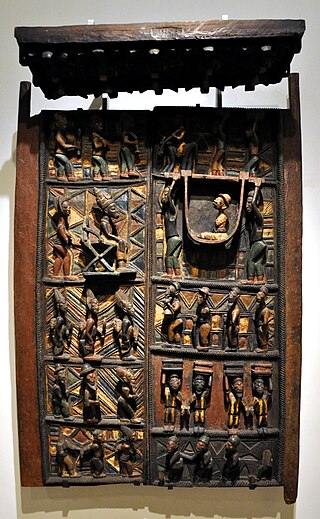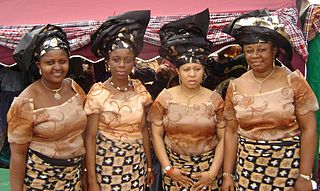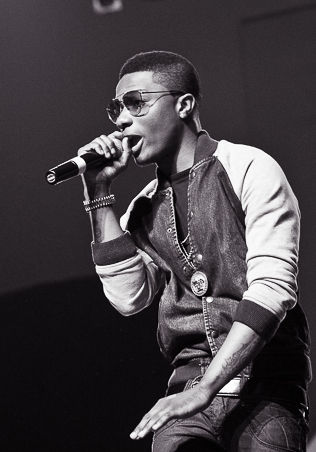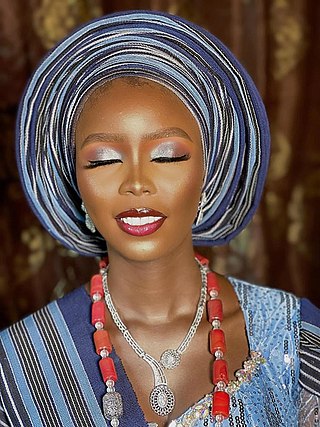Related Research Articles

Chief Ibiagbanidokibubo Asenite 'Agbani' Darego, MFR is a Nigerian model and beauty queen who was crowned Miss World 2001. She was the first black African to win Miss World.

Cornrows are a style of traditionally three-strand braids, originating in Africa, in which the hair is braided very close to the scalp, using an underhand, upward motion to make a continuous, raised row. Cornrows are often done in simple, straight lines, as the term implies, but they can also be styled in elaborate geometric or curvilinear designs. They are distinct from, but may resemble, box braids, Dutch braids, melon coiffures, and other forms of plaited hair, and are typically tighter than braids used in other cultures.

The culture of Nigeria is shaped by Nigeria's multiple ethnic groups. The country has 527 languages, seven of which are extinct. Nigeria also has over 1,150 dialects and ethnic groups. The three largest ethnic groups are the Hausas that are predominantly in the north, the Yorubas who predominate in the southwest, and the Igbos in the southeast. There are many other ethnic groups with sizeable populations across the different parts of the country. The Kanuri people are located in the northeast part of Nigeria, the Tiv people of north central and the Efik-Ibibio are in the south South. The Bini people are most frequent in the region between Yorubaland and Igboland.

Olowe of Ise is considered by Western art historians and collectors to be one of the most important 20th century artists of the Yoruba people of what is today Nigeria. He was a wood sculptor and master innovator in the African style of design known as oju-ona.

The wrapper, lappa, or pagne is a colorful garment widely worn in West Africa by both men and women. It has formal and informal versions and varies from simple draped clothing to fully tailored ensembles. The formality of the wrapper depends on the fabric used to create or design it.

A head tie, also known as a headwrap, is a women's cloth head scarf that is commonly worn in many parts of West Africa and Southern Africa. The head tie is used as an ornamental head covering or fashion accessory, or for functionality in different settings. Its use or meaning can vary depending on the country and/or religion of those who wear it. Among Jewish women, the Biblical source for covering hair comes from the Torah in the book of Bamidbar Parshas Nasso which contains the source for the obligation of a married woman to cover her hair. An eesha sotah is a woman whose husband suspects her of having acted immorally. The Torah commands the Kohein to take various steps to demonstrate that the sotah has deviated from the modest and loyal path of most married Jewish women. Among the procedures, the pasuk clearly states: "ufora es rosh haisha..."and he shall uncover the hair of the head of the woman (5:18). One can only uncover something that has previously been covered; in this case the Torah is referring to the married woman's hair. Among Christian women in certain parts of the world, such as Africa and the Caribbean, the head tie is worn as a headcovering in obedience to 1 Corinthians 11:4–13.

Aso oke fabric, is a hand-woven cloth created by the Yoruba people of west Africa. Usually woven by men and women, the fabric is used to make men's gowns, called agbada and hats, called fila, as well as women's wrappers, called iro and head tie, called gele.

Juju Music is the 1982 major label debut of Nigerian jùjú band King Sunny Adé and His African Beats. It was produced by keyboard player Martin Meissonnier, who introduced synthesizers and Linn drums into Adé's established juju sound. It represented the first worldwide release for Adé, who was already established in his native Nigeria as its "biggest musical draw and juju music's reigning monarch". The album was a critical and commercial success, peaking at #111 on Billboard's "Pop Albums" chart.
Igbo culture are the customs, practices and traditions of the Igbo people of southeastern Nigeria. It consists of ancient practices as well as new concepts added into the Igbo culture either by cultural evolution or by outside influence. These customs and traditions include the Igbo people's visual art, music and dance forms, as well as their attire, cuisine and language dialects. Because of their various subgroups, the variety of their culture is heightened further.
Olufunmilola Aduke Iyanda, better known as Funmi Iyanda, is a talk show host, broadcaster, Film and TV producer, media executive, philanthropist, journalist, and blogger. She produced and hosted a talk show, New Dawn with Funmi, which aired on the national network for over eight years. Iyanda rose to become one of Nigeria’s most watched TV personalities. Funmi is the CEO of Ignite Media now OYA Media. In 2011, Iyanda was honored for her web series by the World Economic Forum and was named one of Forbes "20 Youngest Powerful Women in Africa".

Ayodeji Ibrahim Balogun, who is known professionally as Wizkid, is a Nigerian singer and songwriter. Born in the Ojuelegba suburb of Surulere, Lagos, Wizkid is a prominent voice in the emerging Afrobeats movement. His music is blend of Afrobeats, afropop, R&B, afrobeat, reggae, dancehall, and pop. He began recording music at the age of 11 and released a collaborative album with the Glorious Five, a group he and a couple of his church friends formed. In 2009, Wizkid signed a record deal with Banky W's Empire Mates Entertainment (E.M.E). He rose to the limelight after releasing "Holla at Your Boy", the lead single from his debut studio album, Superstar (2011), which also spawned the singles "Tease Me/Bad Guys" and "Don't Dull".

Tinsel is a Nigerian soap opera that began airing in August 2008. On 23 May 2013, the show's 1000th episode aired. It has been called "the most successful television drama on Nigerian television in recent times". On 21 Jan 2021, the show's 3000th episode aired.
Toyin Sokefun-Bello, who is better known as TY Bello, is a Nigerian singer, songwriter, photographer and philanthropist. Prior to pursuing a solo career, she was a member of the now defunct gospel band Kush. Bello is currently a member of the Nigerian photography collective, Depth of Field. She has released the albums Greenland (2008), The Future (2011), The Morning Songbook (2014), Africa Awake (2021), We Are Fire (2022) and Heaven Has Come (2023).
Funmi Falana is a Nigerian legal practitioner and women's rights activist.
Segun Gele is a Nigerian born make-up artist and entrepreneur based in United States. His work was featured on CNN for his ability to tie the gele in flamboyant style, a fashion attire of significant importance to the Yoruba, Nigerian and West African women's fashion culture.

The fashion industry in Nigeria plays an important cultural role and contributes significantly to the country's economy. Clothing incorporates a variety of colours, fabrics, and embellishments. Many of the component cultures of Nigeria wear styles that are characteristic of their tribal society and customs. Nigeria produces fashionable textiles and finished garments and has designers who have achieved international recognition.
Sir John Barnett, known professionally as Sir John, is a make-up artist, activist, influencer, and executive. He is best known for being a creative collaborator and make-up artist of Beyoncé. Among those he has done make-up work for include Naomi Campbell, Serena Williams, Chrissy Teigen, Priyanka Chopra, Margot Robbie, Zendaya, Naomi Osaka, Mary J Blige, Iman, Celine Dion, Viola Davis, Erykah Badu, Joan Smalls, and Kat Graham. Sir John is a creative director for L'Oreal Paris USA and the Chief creative officer of CTZN Cosmetics.

Gele is a traditional head tie native to Yoruba women. The gele comes in specific shapes and designs. Gele is worn with other Yoruba women's outfits, like Iro ati buba, Komole and Asoebi.

Yoruba women’s clothing is the traditional attire worn by women of the Yoruba ethnic group in parts of Nigeria, Benin and Togo in a region called Yorubaland. The clothing reflects the rich culture, history and aesthetic preferences of the Yoruba people.
Bimpe Onakoya is a Nigerian makeup artist, founder of Elite Makeup Pro and artistic director of Maybelline New York Nigeria. She is the first African based makeup artist to work at New York Fashion Week and has worked with several top designers including DKNY, Lacoste and LaQuan Smith.
References
- ↑ "Avant Garde Gele". The Guardian Nigeria. 2016-07-23. Retrieved 2024-02-10.
- ↑ "Today's Woman Everyday - Funmi Olurinola". TW Magazine Website. 2018-11-14. Retrieved 2024-02-10.
- ↑ JN, Stephen (2023-12-26). "How To Make Rose Auto Gele -". Tabloid. Retrieved 2024-02-10.
- ↑ "DIY – How To Tie The Famous Auto Gele and Turban | SPICE TV Africa". 2018-04-23. Archived from the original on 2024-03-12. Retrieved 2024-02-10.
- ↑ "ALLURE COVER: FUNMI OLORINOLA : – REDEFINING THE ART OF GELE". Allure Vanguard. February 25, 2019. Retrieved February 10, 2024.
- ↑ Obiuwevbi, Jennifer (2015-09-22). "Funmilola Olurinola of Abeke Makeovers debuts "Oriki" – A Celebrity Inspired "Iconic Gele" Collection!". BellaNaija. Retrieved 2024-02-10.
- ↑ "Ebube Nwagbo, Qunicy Ayodele, Kola Kuddus, Uti Nwachukwu, Yomi Makun, More, Winners At The 4th Glam & Essence Style Awards!". The Will News. 2015-11-17. Retrieved 2024-02-10.
- ↑ "Eloy Awards 2015". Exquisite Magazine. 2015-10-04. Retrieved 2024-02-10.